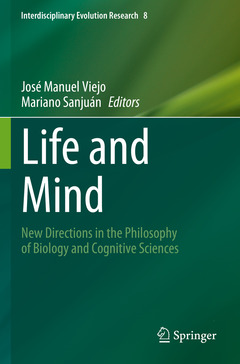Life and Mind, 2023 New Directions in the Philosophy of Biology and Cognitive Sciences Interdisciplinary Evolution Research Series, Vol. 8
Langue : Anglais
Coordonnateurs : Viejo José Manuel, Sanjuán Mariano

This volume provides a broad overview of some cutting-edge philosophical topics of growing interest at the juncture between cognitive science and biology. The main goal is not to integrate the variety of approaches into a single account, but rather to offer diverse perspectives on a collection of selected biological issues of particular philosophical relevance, reflecting the plurality of current research in these areas.
Four conceptual vectors give this volume its coherence:
- Animal and human cognition: With respect to animal cognition, this volume focuses on self-awareness and methodological flaws in the science of animal consciousness. Regarding human cognition, the authors of this volume address various aspects of so-called 4E cognition.
- Genetics: The role of genes in the development of mind and life has always been philosophically controversial. In this volume, the authors address the possibility of considering post-genomic genes as natural kinds and the proper analysis of the concept of genotype.
- Teleology: This volume addresses issues of evolutionary causality and teleosemantics, as well as questions relating to biological teleology and regulation.
- Evolution: Evolution exemplifies better than any other concept the convergence point between philosophy, biology and cognitive sciences. Among other things, the volume deals with the origin of novelties in evolutionary processes from various viewpoints (e.g., cultural evolution and developmental plasticity).
Despite their disparity, all these topics belong to a common naturalistic framework. By presenting them in a single volume, the editors want to emphasize the need to always conduct philosophical research on mind and life with tangential domains in mind.
This book is a valuable resource for students and researchers of philosophy with a special interest in life, cognition, and evolution, as well as for biologists and cognitive scientists.
Life and Mind: An Introduction.- Part I: Embodiment, Perception and Cognition.- Animal Understanding and Animal Self-Awareness.- A Methodological Response to the Motley Crew Argument. Explaining Cognitive Phenomena through Enactivism and Ethology.- Causal Closure, Synaptic Transmission, and Emergent Mental Properties.- Color and Competence: A New View of Color Perception.- Menstrual Cycles as Key to Embodied Synchronisation.- Part II: Evolution, Language and Culture.- Is Cultural Selection Creative?.- Incommensurability in Evolutionary Biology: The Extended Evolutionary Synthesis Controversy.- Ontologies in Evolutionary Biology: The Role of The Organism in The Two Syntheses.- Tree Thinking and The Naturalization of Language.- Part III: Gene and Genotype Metaphysics.- A New Perspective on Type-Token Distinction in The Genotype and Phenotype Concepts.- The Gene as a Natural Kind.- Part IV: Teleology in Biology and Cognitive Sciences.- Evolutionary Causation and Teleosemantics.- Teleological Explanations and Selective Mechanisms. Biological Teleology Beyond Natural Selection.
José Manuel Viejo obtained his PhD in Philosophy and Language Sciences from the Autonomous University of Madrid in November 2019. Before that, he graduated in Philosophy from the Autonomous University of Madrid and obtained a Master's degree in Logic and Philosophy of Science from the University of Salamanca. He taught several subjects at an undergraduate level (Philosophy of Language, Philosophy of Mind, Theory of Knowledge) in the Department of Logic and Philosophy of Science at the Autonomous University of Madrid. Currently, he is Professor-Tutor of Philosophy of Language at the National Distance Education University. During his PhD, he was a visiting researcher at the University of California Riverside and the Institut Jean Nicod. He has been part of the R&D projects “Material cultures, epistemic cultures. Standards, cognitive practices, and knowledge”, funded by the Spanish Ministry of Economy, Industry, and Competitiveness, and “Intellectual autonomy in environments of epistemic dependence”, funded by the Spanish Ministry of Science and Innovation. He is also part of Madrid Philosophy Network, AEGEA (Applied Epistemology Research Group), the Spanish Society for Logic, Methodology and Philosophy of Science and the Spanish Society for Analytic Philosophy. His main research interests lie in the philosophy of mind and language, with a special focus on the issue of the semantics of propositional attitude ascriptions. Some of his other research interests are in the history and philosophy of science, the philosophy of biology, the philosophy of logic, epistemology and metaphysics.
Mariano Sanjuán
Mariano Sanjuán is Teaching Fellow and PhD candidate at the Department of Logic and Philosophy of Science of the Autonomous University of Madrid with a thesis on the recent history of scientific pluralism. He graduated in Philosophy from the University of Zaragoza and San Diego State University and hold
Explores philosophical issues at the crossroads of cognitive science and biology Mirrors the diversity of current research in the philosophy of biology and cognitive science A valuable ressource for philosophers, biologists and cognitive scientists
Date de parution : 06-2024
Ouvrage de 329 p.
15.5x23.5 cm
Date de parution : 06-2023
Ouvrage de 329 p.
15.5x23.5 cm
Thèmes de Life and Mind :
© 2024 LAVOISIER S.A.S.



